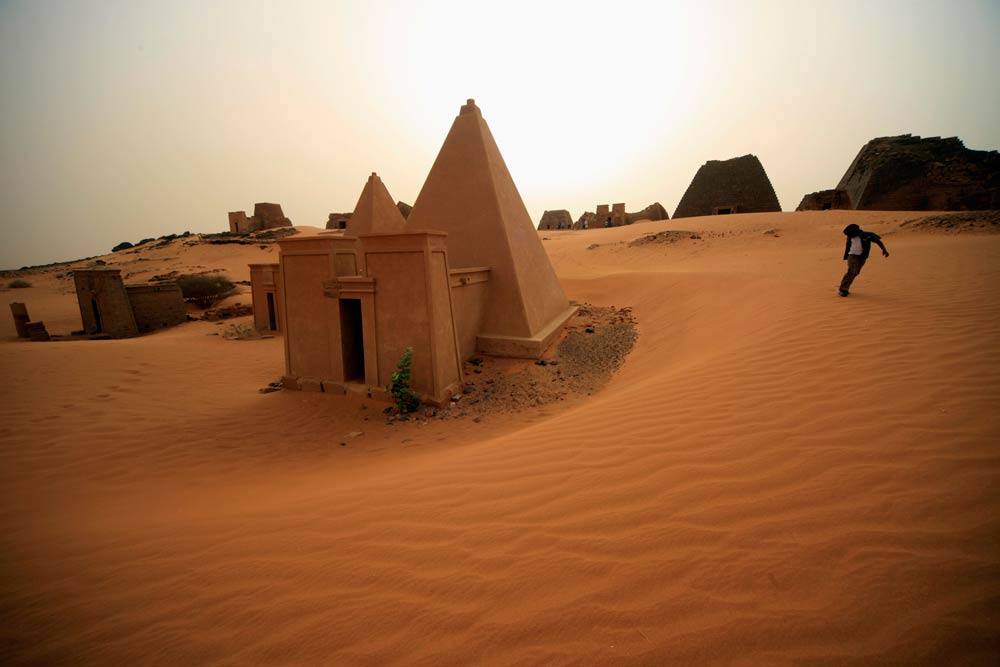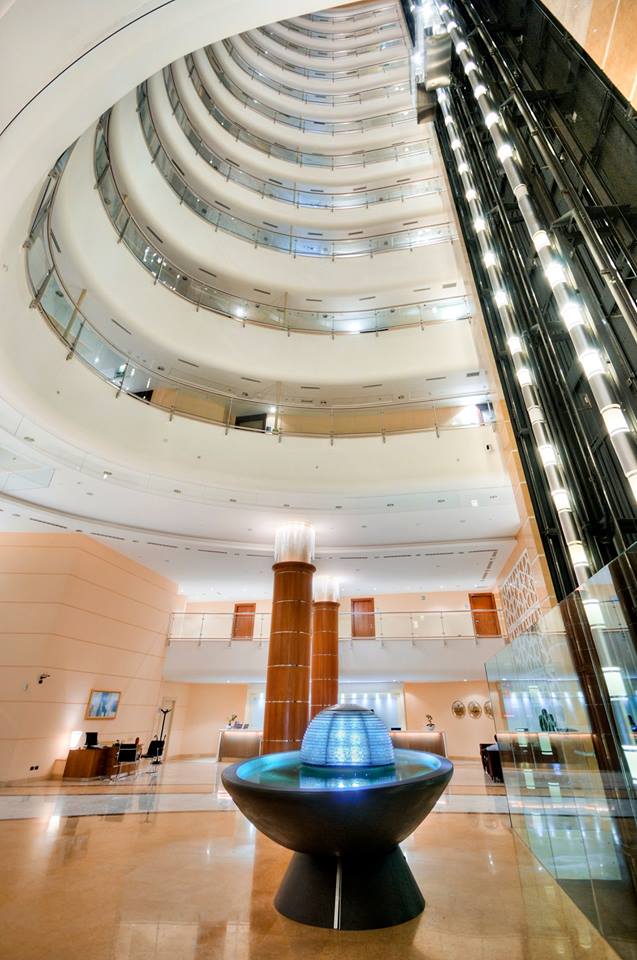The fine stone carving shows a wide-hipped Nubian queen triumphant over Romans and other foreign pretenders to her throne. Beyond the chapel are the remains of the pyramid that was her royal tomb. In immaculate silence, dozens more ancient pyramids dot the landscape where, as Shelley put it, “the lone and level sands stretch far away”.
This is Meroë in Sudan, a country that boasts more pyramids than Egypt. The road to Meroë was built by an unlikely entrepreneur – Osama bin Laden, who later relocated to Afghanistan. This is just one example of the weird and wonderful experience of being a tourist in Sudan. That so few make the trip is, critics say, an indictment of the government’s failure to exploit its fabulous potential as a destination.

“Announcing that this year you’re holidaying in the Sudan has an effect on bystanders akin to expressing a liking for punting on the Styx or arm wrestling with alligators,” notes the Bradt travel guide to one of Africa’s most enigmatic lands.
A rare privilege
In the mid-6th century BC, Meroë became the central city of the Nubian Kushite dynasty, the “Black Pharaohs” who ruled from Aswan in southern Egypt to present-day Khartoum. The Nubians were variously both rivals and allies of the ancient Egyptians and adopted many of their rituals, including burying kings, queens and nobles in pyramid tombs.
More than 200 pyramids have been discovered in and around Meroë. Several were decapitated by the 19th century Italian explorer and zealous treasure hunter Giuseppe Ferlini. Finally, in 2011, they gained world heritage site status from Unesco. Darker in hue than those 800 miles to the north in Giza, Egypt, because of the iron-rich rocks here, Meroë later became a centre of iron production and has been dubbed “the Birmingham of Africa” – not necessarily a slogan that will bring British holidaymakers flocking.
Untouched by commercialism, the pyramids are also smaller, drastically less crowded and free of the touts and hustling “guides” who pester patrons of Giza. A ticket seller at the site in Meroë said it usually receives around 10 visitors a day, meaning there are good odds of exploring them entirely alone – a rare privilege at any historical monument in the 21st century.
Tourist secrets
David Belgrove, deputy head of mission and consul-general at the British embassy in Sudan, likes to go camping there and has run into a few German and Japanese tourists, but no Britons. “I remember vividly the first time I saw it,” he said. “We arrived at night so the first I saw was the sun rising on the pyramids. I felt immensely privileged to have the site all to myself. Nothing beats it.”
He added: “A lot of the sites in Sudan are great tourist secrets. The beauty is that you just can pitch up and there are often archaeological teams who will explain to you what they’re doing. The history of civilisations here goes back millennia, but many Sudanese themselves are not aware of it.”
The Islamic government’s lacklustre efforts to promote this heritage could be partly due to distractions that include waging domestic wars on various fronts, the breakaway of the south in 2011 and an economic crisis. But some believe there is also an ideological reason. A Meroë expert, not named here to protect his safety, commented: “Politicians are foolish. They want only Islam. If we talk about the ancient god Amun, they think we believe in it. They say there can only be one religion.
“Also, they are paranoid that all foreigners are spies. They should be open minded but they are closed.”
Sudan has fitfully applied hardline Islamic laws and president Omar al-Bashir, who came to power in a coup 25 years ago, has vowed that the next constitution will be “100% Islamic”. Apparently this includes sightseeing.
One Khartoum-based analyst said: “When the government have occasionally talked about tourism, they talk about Islamic tourism. You don’t get the impression they celebrate the history and things they’ve got on their doorstep. I think there’s a reluctance to embrace what they would regard as heathen worship.”
Gaddafi’s Corinthia Hotel
Nor could Sudan’s government ever be accused of making this a user-friendly destination. For those undeterred by the ongoing conflicts in Darfur and elsewhere, or by last year’s violent protests in Khartoum, a visa is required in advance and can be bureaucratic even by African standards. Travellers to Meroë are also obliged to hand over photocopies of their visitor permit at checkpoints along the way.
On arrival in the country, iPhone users who link to gmail may be disconcerted to find their contacts and emails wiped from their handset. Further investigation elicits the message: “Unable to sign in from this country. You appear to be signing in from a country where Google Apps accounts are not supported.”
This is not the only way in which international sanctions make themselves felt. Credit cards are useless in Sudan and only cash will do. Barclays bank used to be here but not any more. Familiar US fast food chains such as Burger King, KFC and McDonald’s are nowhere to be seen, something that many independent travellers may welcome. Instead of Starbucks, there is Starbox Coffee & Restaurant.

But Sudan did have a friend in the slain Libyan leader Muammar Gaddafi, manifest in the five-star Corinthia Hotel, built in the 1990s on what used to be the city zoo and resembling a giant glass and steel Easter egg by the Nile. One recent evening, an oil company was hosting a send-off there for one of its executives, while Chinese guests shopped for art and craft souvenirs and glass elevators shot up 18 floors to the Asian-themed Rickshaw restaurant. A receptionist in the gaudy lobby explained that rooms cost $295 a night, while a sign on the desk warned: “Credit cards are not accepted in Sudan.” Outside, a giant photo of The Muppets advertised a children’s cinema.
The Corinthia is part of the jumbled patchwork of architectural styles in dusty, diffuse, sprawling Khartoum, where public spaces are few and far between. The intrepid who come here can view stupendous ancient temples and early Christian paintings at the National Museum, stroll through the colourful Omdurman Souq, find echoes of British colonialism in an old Anglican church, visit the tomb of the Mahdi who famously defeated general Charles George Gordon, watch “whirling dervishes” at the Hamed al-Nil Tomb on Fridays, survey British war graves at a pristine cemetery and sip hibiscus tea on a grass bank by the Nile.
Bin Laden the construction worker
One spot the government is definitely not promoting, however, is the former home of Osama bin Laden in the upmarket al-Riyadh suburb. The future al-Qaida leader moved here from Saudi Arabia in 1991 and invested heavily in agriculture and construction – hence the asphalt road that cut the journey from Khartoum to Meroë to about three and a half hours. But under pressure from the US and Saudi Arabia, Sudan forced Bin Laden out in 1996 and seized some of his personal assets. He moved to Jalalabad in Afghanistan.
Ghazi Salahuddin Atabani, a prominent politician who recently quit the government, met Bin Laden once, in 1993. He recalled: “He didn’t have al-Qaida around him then. He was a construction worker. The main thrust of our discussion was the economy. He talked a lot about the potential Sudan has and the restrictions on investors. We never discussed international politics.
“He was very charming, very charismatic and very softly spoken: you could hardly hear his voice.”
Atabani notes that Sudan lacks the hotels, transport and infrastructure for mass tourism and suggests such development would not entirely be positive. “I saw the pyramids in Egypt in the 60s and there were no tarmac roads,” he said. “When I went back, I was disgusted.”
David Smith for the Guardian Africa Network
